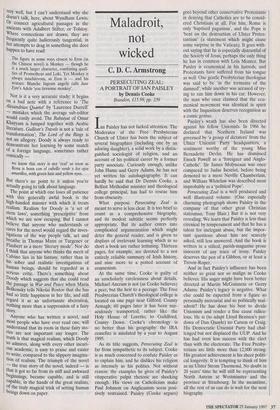Maladroit, not wicked
C. D. C. Armstrong
PERSECUTING ZEAL: A PORTRAIT OF IAN PAISLEY by Dennis Cooke Brandon, £15.99, pp. 239 Ian Paisley has not lacked attention. The Moderator of the Free Presbyterian Church of Ulster has been the subject of several biographies (including one by an adoring daughter), a solid work by a distin- guished sociologist of religion, and an account of his political career by a former party associate. Curiously enough, unlike John Hume and Gerry Adams, he has not yet written his autohagiography. It can hardly be said that Dr Dennis Cooke, a Belfast Methodist minister and theological college principal, has had to rescue him from obscurity.
What purpose Persecuting Zeal is meant to serve is less clear. It is too brief to count as a comprehensive biography, and its modest subtitle seems perfectly appropriate. But its author enters into complicated argumentation which might deter the general reader, and is given to displays of irrelevant learning which in so short a book are rather irritating. Thirteen pages, for example, are devoted to a not entirely reliable summary of Irish history, and nine more to a potted account of ecumenism.
At the same time, Cooke is guilty of an unscholarly carelessness about details. Michael Ancram is not (as Cooke believes) a peer, but the heir to a peerage. The Free Presbyterian Church's theological college is located on one page near Gilford, County Armagh; 60 pages later it has been mir- aculously transported, rather like the Holy House of Loretto, to Guildford, County Down. Cooke's chronology is no better than his geography: the IRA ceasefire is misdated by a year to August 1995.
As its title suggests, Persecuting Zeal is far from sympathetic to its subject. Cooke is as much concerned to confute Paisley as to explain him, and he dislikes his religion as intensely as his politics. Not without reason: the examples he gives of Paisley's vituperative pulpit rhetoric are shocking enough. His views on Catholicism make Paul Johnson on Anglicanism seem posi- tively restrained. Paisley (Cooke argues) goes beyond other conservative Protestants in denying that Catholics are to be consid- ered Christians at all. For him, Rome is only 'baptised paganism', and the Pope is `bent on the destruction of Ulster Protes- tantism' (a statement which might cause some surprise in the Vatican). It goes with- out saying that he is especially distrustful of the Society of Jesus, perhaps the only thing he has in common with Lola Montez. But Paisley is ecumenical in his hatreds, and Protestants have suffered from his tongue as well. One gentle Presbyterian theologian was said to be 'in the torments of the damned', while another was accused of try- ing to run him down in his car. However, the man who once claimed that the ecu- menical movement was identical in spirit with the Inquisition deserves recognition as a comic genius.
Paisley's wrath has also been directed against his fellow Unionists. In 1966 he declared that Northern Ireland was governed by 'a group of dictators' from the Ulster Unionist Party headquarters, a sentiment worthy of the young Miss Bernadette Devlin. He has dismissed Enoch Powell as a 'foreigner and Anglo- Catholic'. Sir James Molyneaux was once compared to Judas Iscariot, before being demoted to a mere Neville Chamberlain, and William Whitelaw was described most improbably as a 'political Pope'.
Persecuting Zeal is a well produced and well illustrated volume. (One especially charming photograph shows Paisley in the company of that other great Christian statesman, Tony Blair.) But it is not very revealing. We learn that Paisley is less than eirenical by temperament and that he has a talent for inelegant abuse, but the impor- tant questions about him are scarcely asked, still less answered. And the book is written in a stilted, parish-magazine prose innocent of any trace of irony. Paisley deserves the pen of a Gibbon, or at least a Trevor-Roper.
And in fact Paisley's influence has been neither so great nor so malign as Cooke believes. His anger might have been better directed at Martin McGuinness or Gerry Adams. Paisley's legacy is negative. What else could be expected from a figure so personally mercurial and so politically mal- adroit? He has done his best to divide Unionism and render a fine cause ridicu- lous. He is (to adapt Lloyd Bentsen's put- down of Dan Quayle) no Carson or Craig. His Democratic Unionist Party had chal- lenged but not displaced the UUP. And he has had even less success with the elect than with the electorate. The Free Presby- terians are little more than 12,000 strong. His greatest achievement is his sheer politi- cal longevity. It is tempting to think of him as an Ulster Strom Thurmond. No doubt in 20 years' time he will still be representing North Antrim at Westminster and the province at Strasbourg. In the meantime, all the rest of us can do is wait for the next biography.


































































 Previous page
Previous page